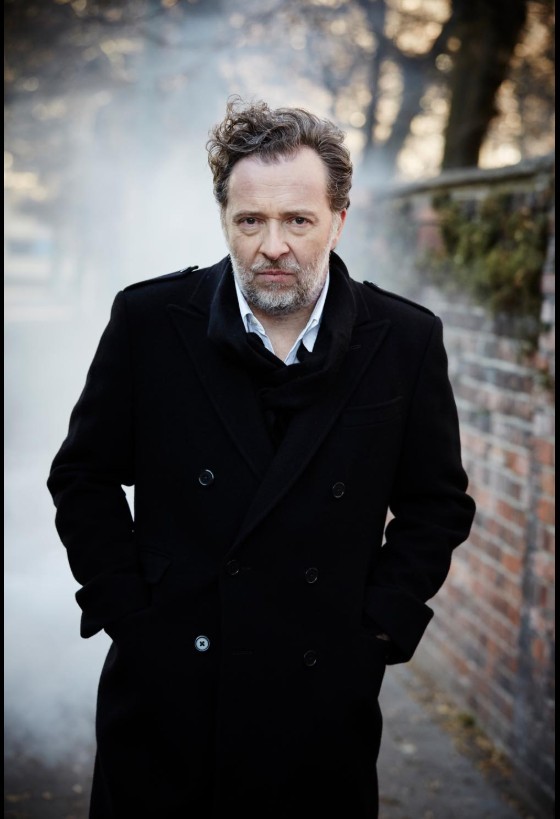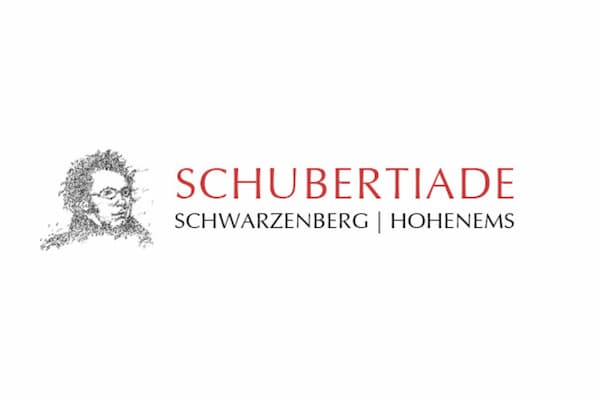First there was the Mozart idea and then there was the Schubert idea. Building on a foundation begun by Gerd Nachbauer, who had founded the Mozartgemeinde Voralberg in 1972 with the intention of performing the works of Mozart in the city of Hohenems, the baritone Hermann Prey suggested another subject: Schubert.

Wilhelm August Rieder: Franz Schubert, oil painting (1875) after an earlier watercolour (1825) (Vienna Museum)
It started as an idea put forward by Hermann Prey: perform all the works of Schubert in chronological order and do it in 12 years. Hermann Prey had been contacted to perform in the Mozart concerts, but approached Nachbauer with his Schubert idea. The composer of the festival changed from Mozart to Schubert, and a new Festival was on its way.
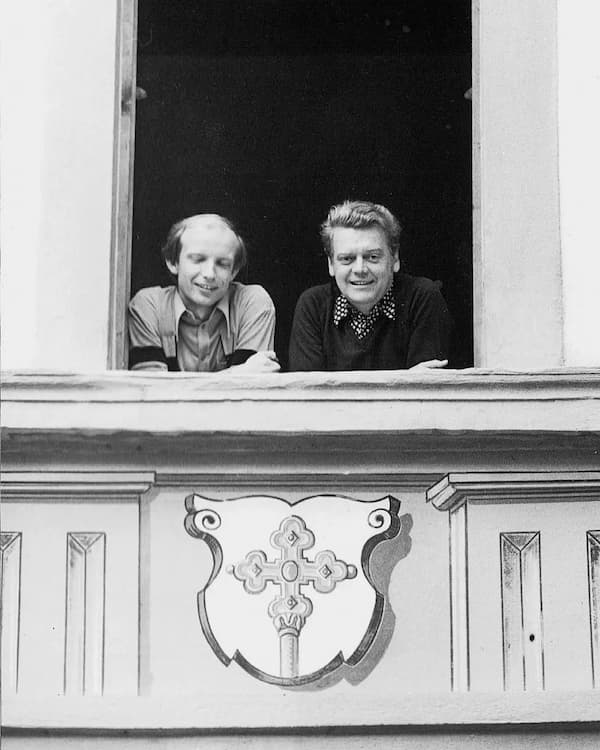
Gerd Nachbauer with Hermann Prey
The first Schubertiade started in 1976: an 8-day program from 8 May to 16 May of Schubert’s music. Not just lieder but also piano music, chamber music, and sacred music. The festival opened with a brief concert of 4 Schubert lieder, sung by Hermann Prey, with Leonard Hokanson on the piano.
By the next year, the calendar had already expanded. The 1977 performances started on 18 June. The 19 concerts over the 12-day Festival included performances by the Vienna Philharmonic, a piano recital with Sviatoslav Richter, church and chamber concerts, and, of course, 5 lieder recitals.
After the 1977 concerts, it became clear that Prey’s idea of performing all of Schubert’s works in chronological order starting in 1978 was unfeasible. The funding was not available to support what would be an expensive program covering operas and symphonies down to works for piano solo. Hermann Prey resigned as Artistic Director following the 1980 Schubertiade and made his final appearance in 1981.
Franz Schubert: Willkommen und Abschied, D. 767 (Hermann Prey, baritone; Karl Engel, piano)
2025 marks the 50th Schubertiade. It starts on 26 April and extends to 14 July, before resuming on 23 August for a week and again in October for 5 days. Over the course of the Festival, there will be 69 concerts: 30 lieder recitals, 26 chamber concerts, and 13 piano recitals.
In many ways, the 2025 Schubertiade is a culmination of all that went before (without the orchestral concerts). Both established performers and up-and-coming ones have a place on the Festival stages, and the repertoire, still solidly Schubert, also includes Beethoven and Debussy, lieder by Mahler, and the F.A.E. Sonata jointly written by Albert Dietrich, Robert Schumann, and Johannes Brahms. Even familiar Schubert is given a new look, with The Erlkings bringing their performance of an English-language Winterreise, arranged for guitar, violoncello, tuba and percussion.
Franz Schubert: Erlkönig (in English), D. 628 (The Erlkings)
Andrè Schuen and Daniel Heide build on their past triumph of Winterreise to bring the songs from Schwanengesang and a concert intriguingly called ‘Dreams / Nighmares’ to the Festival.
Franz Schubert: Winterreise, Op. 89, D. 911 – No. 24. Der Leiermann (Andrè Schuen, baritone; Daniel Heide, piano)
Works for piano 4-hands (Yaara Tal and Andreas Groethuysen, Elisabeth Leonskaja and Julius Drake, the Geister Duo), string quartets (Goldmund Quartet, Pavel Haas Quartet, Arminda Quartet, Aris Quartet, Minetti Quartet, Simply Quartet, and others), and all variety of solo piano performances give us many sides of Schubert and his contemporaries and followers.
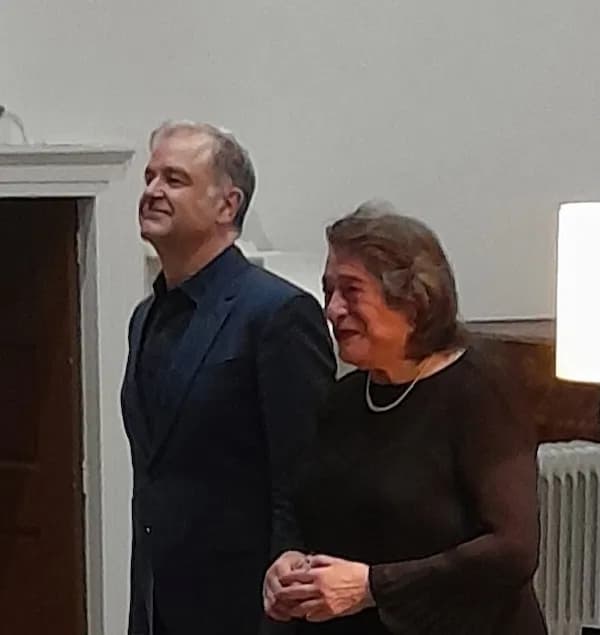
Elisabeth Leonskaja and Julius Drake
Die schöne Müllerin will be performed by tenor Patrick Grahl with Daniel Heide and later in the Festival by baritone Konstantin Krimmel with Ammiel Bushakevitz on piano. In addition to The Erlkings’ instrumentally augmented Winterreise, we also hear it performed by Ilker Arcayürek with Ammiel Bushakevitz, and Julian Prégardien with Daniel Heide.

Patrick Grahl with Daniel Heide

Ilker Arcayürek with Ammiel Bushakevitz
As a showcase for Schubert, there’s none better in the world. As a festival, the Schubertiade has grown and expanded to be considered one of the top summer festivals. Its expansion into the fall has given it a new audience and the addition of music by those influenced or in the circle of Schubert gives his music both artistic context and historical lineage.
The gradual improvement in their performing spaces has given the Festival the opportunity to bring Schubert’s music to larger audiences.
Franz Schubert: Symphony No. 8 in B Minor, D. 759, “Unfinished” – I. Allegro moderato (L’Orfeo Baroque Orchestra; Michi Gaigg, cond.)
A recording program, starting with the 2018 recording of all of Schubert’s symphonies and symphonic fragments by the L’Orfeo Baroque Orchestra, directed by Michi Gaigg (CPO 555228-2) has led to further recordings by the Jerusalem Quartet; Pavol Breslik and Amir Katz (Winterreise); Sharon Kam, Ori Kam, and Matan Porat (works by Mozart, Schumann, Brahms, and Bartók); Daniel Heide and Andrè Schuen (Winterreise, Liszt’s Petrarch Sonnets), Sumi Hwang and Helmut Deutsch (Lieder by Strauss, Britten, and Liszt), and Khatia Buniatishvili (Schubert’s Sonata in B flat), all recorded live in Markus Sittikus Hall, Hohenems.
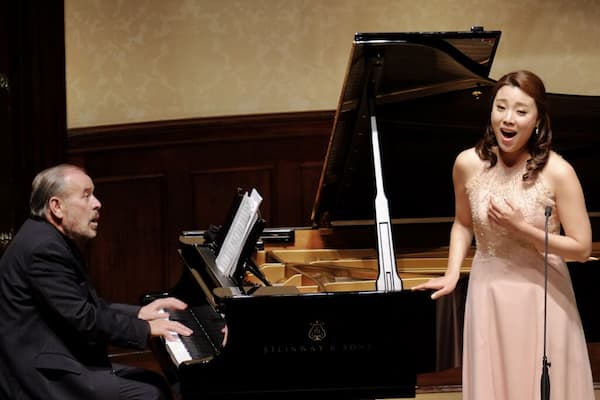
Sumi Hwang and Helmut Deutsch (Photo by Jonathan Rose)
Lieder recordings from the Angelika Kauffmann Hall, Schwarzenberg by mezzo-soprano Elisabeth Kulman and Eduard Kutrowatz, and by Diana Damrau with Helmut Deutsch show off the famous sound of the hall. In addition, concerts are broadcast on Ö1 (Austria) – check the Schubertiade website for broadcast times.
From Franz Schubert’s evening concerts at home to the world-famous Schubertiade celebrating its 50th anniversary, Schubert’s music has always been something to enjoy together.
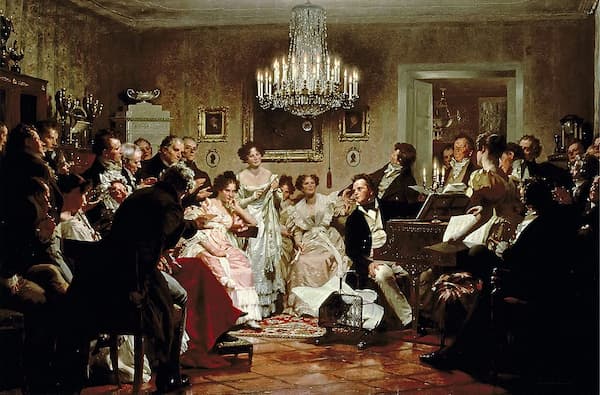
Julius Schmid: Schubertiade, 1897 (Wiener Männergesang-Verein)
Schubertiade 2025 – Season Overview
For more of the best in classical music, sign up for our E-Newsletter

